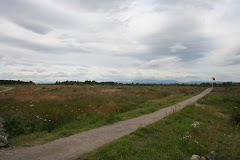It's been a quiet week in Winchester. That sounds a lot like the beginning of a Garrison Keillor monologue. A bit warm, but nice. I got some tennis in during the evening hours when it was almost cool. No golf or fishing, simply too warm for my taste. Daily, I'm working at guitar and bagpipes. My lip and diaphragm are developing, slowly.
I watched the All-Star Game last night. An American League victory, again. That's ten years in a row. The baseball season is at its halfway mark. The American League East seems to be all Boston with a bottleneck in the middle. New York and Toronto are tied for second at 10 games out apiece. The Orioles are 15 games out. The First Church trip to Camden is not far off.
I completed Egri's book. It was a very slow read. The book read like a transcription of a series of lectures on writing. I don't know if it will make me a better writer of sermons. I do know that it will make me a better reader of novels and short stories as well as a better watcher of movies and plays. Egri is big on any literary work abiding by its fundamental premise. In Egri's words: "Every sensible invention must have a purpose, every planned sprint a destination." For example, the premise of Romeo and Juliet is "Great love defies even death." For King Lear, "Blind trust leads to destruction." For Macbeth, "Ruthless ambition leads to its own destruction." And so on.
The bulk of Egri's book is on character. According to Egri, for the dramatist, each character possesses a physiology, a sociology, and a psychology. Each of these "-ologies" makes us who we are and plays a significant role in what we say and how we behave.
Egri is "old school" in that he is a proponent of the Socratic dialectic. Each literary work should begin with a thesis, then move to a contradiction of the thesis, antithesis, and eventually land on a synthesis, a combination of the original proposition and the contradiction to it.
Here are some of my favorites quotes from Egri's book. The first is Egri citing Oscar Wilde -- "The only thing that one really knows about human nature is that it changes. Change is the one quality we can predicate of it. The systems that fail are those that rely on the permanency of human nature, and not is growth and development."
"There is only one realm in which characters defy natural laws and remain the same -- the realm of bad writing . . . Any character, in any type of literature, which does not undergo a basic change is a badly drawn character."
Egri sets up a nice quote by first citing Emerson, "What is a weed? A plant whose virtures have not yet been discovered." After a lengthy exploration of how plot and character interact, Egri writes, "What is a character? A factor whose virtures have not yet been discovered." This is where plot comes in.
Egri's chapter on "Point of Attack" is probably the most applicable when it comes to sermon writing. Egri states: "When should the curtain rise? What is the point of attack? When the curtain goes up, the audience wishes to know as soon as possible who these people on the stage are, what they want, why they are there? What is the relationship between them?" In the case of a sermon, a good point of attack is where something vital is at stake at the very beginning. The first line spoken should start the "crisis," or conflict to be resolved, and the inevitable drive toward the proving of the premise.
Egri has a good chapter on tranistion in literary writing. He uses nature as an analogy. "Nature never jumps. She works in a leisurely manner, experimenting continuously." Don't think too long about this analogy, you will find problems with it -- tornadoes, floods, hurricanes, volcanic eruptions, tsunamis, etc. Nature can and does jump. That said, let's stick with Egri for a moment. Certainly, every human life as two main poles -- life and death -- between which there is transition. At the close of the chapter Egri writes: "Every tissue, every muscle and bone in our bodies, is rejuvenated every seven years [Is this true? My high school biology is way back in the rear view mirror and I didn't fact check Egri here]. Our attitude and outlook on life, our hopes and dreams are also constantly changing. This transformation is so imperceptible that usually we are not even aware that it is taking place in our bodies and in our minds. This is transition: we are never, for any two successive moments, the same. And transition is the element which keeps the play [and perhaps the sermon -- my words here] without any breaks, jumps, or gaps. Transtion connects seemingly unconnected elements, such as winter and summer, love and hate."
Here is my reading diet while on the road. I hope to post to my blog from the UK, as time and computer availability allow. One book is another required text for my class at Christchurch, Oxford. It is "Becoming a Writer" by Dorothea Brande, originally published in 1934. By the way, if you would like more information about Oxford University's Summer School for Adults, scroll down to "Links worth visiting." I linked their site to my blog. I also linked my instructor's site to my blog. His name is Chris Sykes. He writes for the London stage and teaches at Oxford. The other book in my diet is the definitive one-volume history of Scotland written by J.D. Mackie, titled "A History of Scotland."
That's it for the moment. Peace.
On another matter. On Monday, August 6, I will be transporting daughter and stuff to Williamsburg. Once there, I will need to move a sofa from a storage unit to an apartment. I need a vehicle capable of hauling a sofa. If the weather is fair, an open back pickup truck will work. If you have a vehicle to loan for the day, email me or post to my blog. I plan on leaving in the a.m. and returning in the p.m. of the same day. Thanks.
Wednesday, July 11, 2007
Subscribe to:
Post Comments (Atom)
Links worth visiting
- Dan Kimball's website -- Dan is author of The Emerging Church and pastor of Vintage Church, Santa Cruz, CA
- Calvin Church, Zelienople, PA
- Calvin Institue of Christian Worship
- William and Mary's DOG Street Journal
- Brian McLaren's hompage -- author, speaker, activist
- Isabella Stewart Gardner Museum, Boston, MA
- JFK Presidential Library and Museum, Boston, MA
- My writing instructor at Oxford's Summer School
- Homepage for Oxford University's Oxford Experience
- Simon Fraser University Pipe Band
- One of the guitarists with whom I studied in Maryville
- For the bluegrass music fan with details about the bluegrass guitar camp I will be attending
- Montreat: The starting point for hiking western NC's Blue Ridge wilderness
- For citizens of Red Sox Nation
- My home and place of study while in Glasgow, Scotland, UK
- Here's the site of the bluegrass guitar camp in the TN Smokies
- Take a virtual tour of Cooperstown's Baseball Hall of Fame
- Barnwell Inn: My B&B home away from home in Cooperstown, NY
- First Presbyterian Church, Winchester, VA, USA





















No comments:
Post a Comment